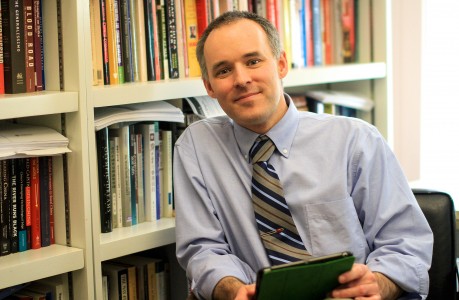
Christopher Mayo is a current Assistant Professor of History at Grinnell College, replacing Matthew Johnson, who is on leave for the 2013-2014 academic year. Mayo received his Bachelors and Masters in East Asian Languages and Cultures from the University of Kansas before getting his Ph.D. from the East Asian Studies Department at Princeton University. He specializes in East Asian history. Mayo will only be here until the end of the spring semester, and he sat down with the S&B’s Yishi Liang to share his experience at Grinnell thus far.
What have been your general impressions of Grinnell College?
I first came here in the spring, for my job interview, and one of the things that I was impressed by when I came was that students had an active voice in hiring the term faculty … It was really exciting to actually sit down and talk with students about what they’re studying and what they wanted to see in a teacher. And the fact that Grinnell had set up a time for me—even though there was very limited time that I was here—to meet with the students, I thought said a lot about where priorities are at the College.
And Grinnell the town?
I love it. I’m from the Midwest. I’m originally from the Kansas City area, so I spent a lot of time in Independence [and] Blue Springs, Miss., these rather small towns—not as small as Grinnell, but I had family in Nebraska and we’d often visit the farms there, and those towns are less than 100 people … But I think every town has a kind of character to it, and something unique about it. For me, Grinnell has been surprisingly enjoyable. I actually enjoy going out in town and talking to people. … If I were going to say one place where I spend the most time outside of Grinnell College campus, it would be Saints Rest [Coffee House].
What has been your least favorite thing about either the College or town?
There are minor things, like the stores close at five. I’d really like to hang out in the town longer. Because classes end in the afternoon, I don’t have an opportunity to enjoy Grinnell if all the stores are closed. … That’s a bit of a shame.
What were you doing directly prior to coming to Grinnell?
I was in a Ph.D. program at Princeton University, studying in the East Asian Studies Department there. While I was finishing my Ph.D., I taught as an adjunct lecturer at CUNY—City University of New York—a City College in New York. I taught half of one class there. I was a replacement for one of the faculty that couldn’t finish the term. And then I came out here.
And what will you be doing after?
I plan to go to Japan and work at Kogakkan University. It’s a small university in Japan, but pretty well-known.
Since Japanese history is your field of expertise, was it your goal to teach in Japan?
Let’s see, what is my goal? I’m still trying to figure that out … But I enjoy teaching so really what I wanted to do was make sure I got a position for next year. Unfortunately, I’d like to stay at Grinnell, but it’s only a one-year position and it’s a term replacement for someone on leave. It’s just not possible for me to stay next year. The job market is such that you have to go where there are openings. And I was fortunate to find a place that would take me on as a regular faculty …
I mean, I love research, I should say that. But the goal, I think amongst a lot of academics, is to both teach and do research. Because I think research alone gets stale. You just sit in a room, or many rooms, and never really talk to people and just hang out with your books.
What are things you’ve gotten from teaching at Grinnell that you plan to recycle in Japan?
One of the things I’ve been really pleased by at Grinnell that I wasn’t expecting is that the students are really active and engaged in the discussions. And they’re willing to tackle very difficult and sometimes controversial issues. Some of these students might feel hesitant to talk or express their opinions on articles or assignments or even about the topic. But Grinnell students have really stepped up and expressed their opinions and really followed along with the analyses in class in a way that, I thought, leads to really rich discussions. … Seeing that that potential is there, I’ll definitely try to cultivate that in the classes I do in the future.
Do you have any additional comments about your experience here?
I’m only here for a year, so there’s the potential that you’d treat me like I don’t really belong here—I’m just a substitute for Matt Johnson. But I don’t get the feeling that I’m treated any differently from any of the other faculty … it’s a very welcoming environment. I think that’s not easy to replicate. I’m guessing that a lot of places would have trouble doing that for temporary faculty.

















































